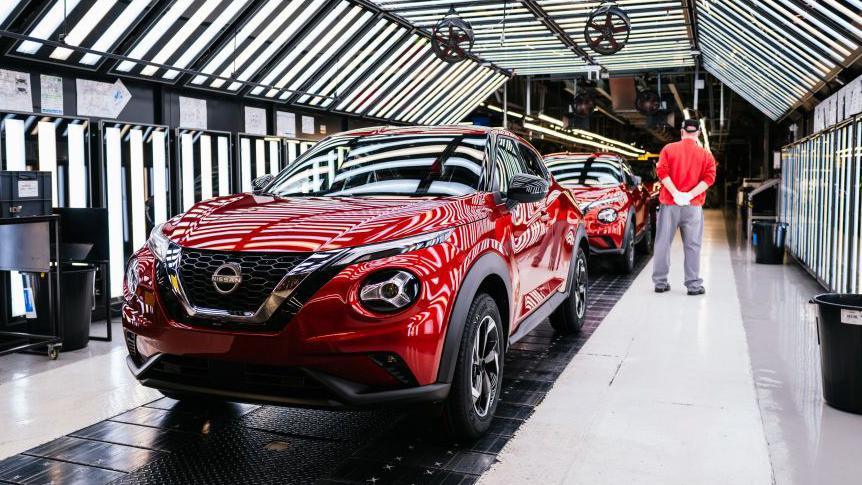UK electric car production drops with firms 'under pressure'

- Published
UK car production fell sharply in October amid industry concerns about "intense pressure" on investment in electric vehicle-making.
Output of all cars dropped by more than 15% from a year earlier, mainly due to a fall in exports following weak demand, the Society of Motor Manufacturers and Traders (SMMT) said.
Production of electric and hybrid vehicles declined by a third compared with last year, due to flagging European demand and the retooling of factories for new models.
The figures come after Vauxhall maker Stellantis said this week it would close its Luton van-making factory, partly due to rules imposed to speed up the transition to electric vehicles in the UK.
In addition, Ford said last week it would cut 800 jobs in the UK over the next three years because of difficult trading conditions, including intense competition and less demand for electric vehicles (EVs).
Mike Hawes, the SMMT's chief executive, said: "These are deeply concerning times for the automotive industry, with massive investments in plants and new zero emission products under intense pressure."
Globally, demand for EVs has slowed, he said, while in the UK, manufacturers have to contend with "the toughest targets and most accelerated timeline" without the incentives necessary for customers to drive demand.
Although production of EVs fell in October, sales of electric cars in the UK have been increasing.
In October, they made up one out of every five cars registered, although industry sources insist this is largely down to unsustainable discounting.
There has been a growing row between the government and the industry over the sale of new petrol and diesel cars being phased out over the next few years.
Under the UK's zero emissions vehicle (ZEV) mandate, manufacturers are currently required to sell a certain percentage of cars and vans that do not emit any emissions ahead of a 2030 ban on the sale of new petrol and diesel cars.
In 2024, EVs must make up 22% of a carmaker's car sales, and 10% of van sales. This target is set to rise.
For every sale that pushes it outside the mandate, firms must pay a £15,000 fine - but they can also buy "credits" from firms that can meet this mandate.
Business Secretary Jonathan Reynolds has said there will be a "fast track" consultation of how the EV targets are enforced.
However, he also reiterated Labour's commitment to the 2030 phase-out of new petrol and diesel vehicle sales.
A spokesperson for the Department for Business and Trade said the government knew the industry "needs certainty and stability" and was investing £2bn in car manufacturing and more than £300m to support the uptake of electric vehicles.
"We continue to work closely with the sector to make the transition a success," the spokesperson added.
Vauxhall owner to close Luton factory
- Published26 November 2024
Ministers told in July of 'likely' Vauxhall closure
- Published27 November 2024
Ford calls for incentives to buy electric cars as backlash grows
- Published27 November 2024
Luton plant closure
The closure of Stellantis' factory at Luton will put 1,100 jobs at risk.
The former UK manufacturing lead for Stellantis, Mark Noble, told the BBC of his “disappointment, shock, and anger” about the closure plans.
He said the site was closing "for a number of reasons that are external to the plant", including uncertainty over Brexit tariffs and the ZEV mandate.
He said troubles for Stellantis' UK plants at Luton and Ellesmere Port "started with Brexit" because it "caused a lot of uncertainty".
"When you've got two UK plants that export 80%+ of their build, with the tariff confusion and no clarity that really hurt the two plants."
He added that for the ZEV mandate the government "has to decide: is this a tax, a £6bn tax on the car companies, or is it their mandate to go green?"
"They need to make it possible for the car manufacturers to meet these targets," he said.
He added that there were still barriers to mass adoption of EVs, including a lack of charging infrastructure.
"If everybody bought an electric vehicle tomorrow, I don’t see how we charge them," he said.
However, Vicky Read, chief executive of EV charging industry body Charge UK, told the BBC a charger "is being installed every 25 minutes".
Charging rollout is reliant on private sector funding, so talk of electric car targets being weakened is “incredibly concerning”, she said.
According to government figures, there are more than 71,000 public charge points in the UK, with 57 added on average each day.
Government adviser James Richardson, the director of analysis for the Climate Change Committee, told the BBC that traditional car companies were at risk of being overtaken by new competitors.
"Companies don't always see how quickly these markets can change, and then they can get left behind," he said.
He said electric sales targets were "really helping to send that signal to companies that they need to move fast, or competitors will come in and take the market from them".